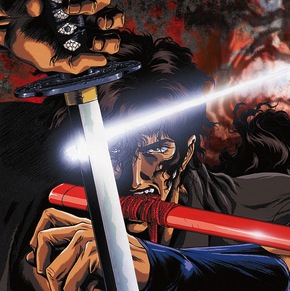

Our protagonist is Jubei Kibagami, a self-described 'vagabond' who hires himself out as a mercenary, but holds to a basic code of ethics - he doesn't overcharge the impoverished villagers, and doesn't hesitate to stop and help strangers. Sex is sometimes depicted erotically or casually, but underlying everything is a kind of disgust, a sickening feeling that is clearly intended by the filmmakers, but for which an explanation doesn't materialize until later in the narrative.ĭeciphering the details of Ninja Scroll's plot can be difficult on one's first viewing - but the basics are clear. Maybe part of this movie's appeal is that it explores a range of attitudes towards its admittedly harsh topics - there are times when violence is lamented, and times when it is celebrated, even wallowed in. Gratuitous sex and violence have their place in media, and this is it. This movie is not for everyone, nor should it be. To be sure, there have been more shocking works of Japanese animation, but Ninja Scroll sets itself apart with an immersive world a story that ropes you in.Ī word of warning - if a studio re-shot this frame by frame as a live action movie and submitted it to the MPAA, it'd probably receive an NC-17 and a half. Ninja Scroll simply isn't a movie that you soon forget about, despite its content and style placing it squarely in the pulp category - maybe even exploitation, or 'grindhouse' anime, if such labels should be applied to anime. A remarkable thing about this film is that this sentiment seems to be fairly common among those I know who have seen it. The first time I saw Ninja Scroll is forever burned into my memory. Starring: Kôichi Yamadera, Emi Shinohara, Takeshi Aono (Japanese), Dean Elliot, Wendee Lee, Stephen Apostolina (English) Whatever the reasons may be for the similar plot threads - Yôtôden stands as a fascinating precursor to Ninja Scroll, differing in a few important ways, and providing a window into the progress in animation between 19.ĭirected by: Yoshiaki Kawajiri (Japanese, I wondered if eight demons represented anything important in Japanese mythology - the nearest thing I could find was the story of Susano'o, who was to slay an eight-headed demon serpent. For all intents and purposes, it seems like Ninja Scroll was a retooled version of Yôtôden, and in many ways they are similar: the eight demons show up again, and once again they're led by a powerful shogun, intent on dominating all of Japan. It tells the tale of the familiar shinobi protagonists, pitted in this case against the likes of 'eight demons' - essentially, a group of incredibly powerful and evil individuals.īut six years earlier, the producers of Ninja Scroll had released Yôtôden, a movie which has flown under the radar of many casual anime fans. When one is first exploring what anime has to offer, they usually end up watching Ninja Scroll eventually, a movie with detailed, realistic and fluid animation that represented some of the best the industry had to offer in the early 1990s.

The anime trope of ninjas with magical abilities dates to the early days of the art-form. Two classic anime films - one popular and one obscure - share some common plot threads.


 0 kommentar(er)
0 kommentar(er)
